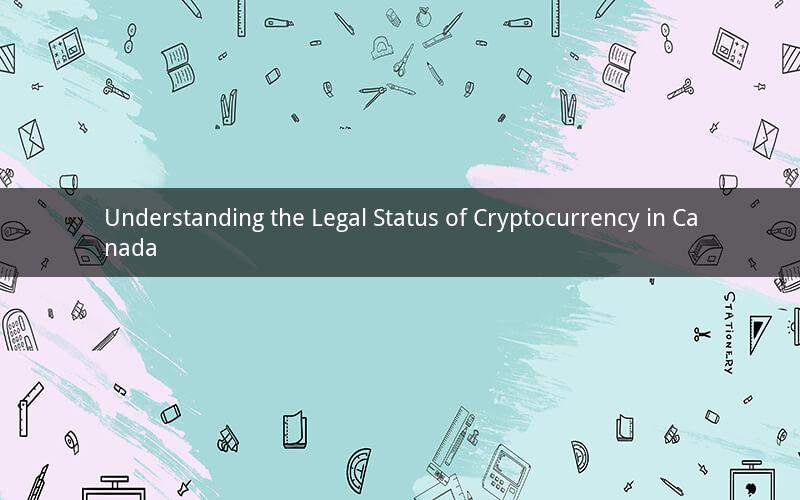
Introduction:
Cryptocurrency has gained immense popularity worldwide, and Canada is no exception. With its innovative and forward-thinking approach, Canada has been a hub for blockchain technology and cryptocurrency adoption. However, many individuals and businesses are still uncertain about the legality of cryptocurrencies in Canada. In this article, we will delve into the legal landscape surrounding cryptocurrencies in Canada, exploring the regulations, challenges, and future prospects.
1. Is Cryptocurrency Illegal in Canada?
No, cryptocurrency is not illegal in Canada. The Canadian government recognizes cryptocurrencies as a form of digital currency and has taken steps to regulate their use. While cryptocurrencies are not explicitly prohibited, there are certain regulations and guidelines that need to be followed.
2. Regulatory Framework for Cryptocurrency in Canada
The Canadian government has implemented various regulations to govern the use of cryptocurrencies. The primary regulatory bodies involved are the Financial Transactions and Reports Analysis Centre of Canada (FINTRAC) and the Canadian Securities Administrators (CSA).
a. Anti-Money Laundering and Counter-Terrorist Financing (AML/CTF) Regulations:
Cryptocurrency exchanges and wallet providers in Canada are required to comply with AML/CTF regulations. This includes conducting customer due diligence, reporting suspicious transactions, and maintaining records of transactions.
b. Securities Regulations:
The CSA oversees the regulation of securities in Canada. Cryptocurrencies that are considered securities must be registered with the appropriate securities commission in the province or territory they are offered in. This ensures that investors are protected and have access to important information about the investment.
c. Taxation:
Cryptocurrencies are subject to taxation in Canada. The Canada Revenue Agency (CRA) treats cryptocurrencies as property, and gains or losses from their disposal are subject to capital gains tax. Additionally, certain transactions involving cryptocurrencies may be subject to Goods and Services Tax (GST) or Harmonized Sales Tax (HST).
3. Challenges and Concerns
Despite the regulatory framework, there are still challenges and concerns surrounding the legality of cryptocurrencies in Canada:
a. Regulatory Arbitrage:
The varying regulatory approaches across different provinces and territories can lead to regulatory arbitrage, where businesses exploit differences in regulations to operate in a more favorable environment.
b. Consumer Protection:
The rapid growth of the cryptocurrency market has raised concerns about consumer protection. Without proper regulation, investors may be exposed to fraudulent schemes and market manipulation.
c. Privacy Concerns:
Cryptocurrencies are often associated with privacy, as transactions can be anonymous. However, this privacy can also be exploited for illegal activities, such as money laundering and financing terrorism.
4. Future Prospects
The legal status of cryptocurrencies in Canada is likely to evolve as the technology continues to advance. Here are some potential future developments:
a. Enhanced Regulatory Framework:
The Canadian government may introduce more comprehensive regulations to address the challenges and concerns associated with cryptocurrencies.
b. Increased Adoption:
As the legal landscape becomes clearer, we can expect increased adoption of cryptocurrencies by individuals, businesses, and financial institutions.
c. Integration with Traditional Financial Systems:
Cryptocurrencies may become more integrated with traditional financial systems, providing greater access to financial services for unbanked populations.
5. Frequently Asked Questions (FAQs)
Q1: Can I use cryptocurrencies for illegal activities in Canada?
A1: Yes, cryptocurrencies can be used for illegal activities. However, the Canadian government has implemented regulations to prevent money laundering and counter-terrorism financing, making it illegal to use cryptocurrencies for such purposes.
Q2: Do I need to declare my cryptocurrency holdings to the Canada Revenue Agency?
A2: Yes, you are required to declare your cryptocurrency holdings to the CRA. Failure to do so may result in penalties and interest.
Q3: Can I trade cryptocurrencies on a regulated exchange in Canada?
A3: Yes, there are several regulated cryptocurrency exchanges in Canada that comply with the country's AML/CTF regulations.
Q4: Are cryptocurrencies considered legal tender in Canada?
A4: No, cryptocurrencies are not considered legal tender in Canada. The Canadian dollar is the official currency.
Q5: Can I use my cryptocurrency to pay taxes in Canada?
A5: No, you cannot use cryptocurrencies to pay taxes in Canada. Taxes must be paid in Canadian dollars.
Conclusion:
In conclusion, while cryptocurrency is not illegal in Canada, it is subject to regulations and guidelines. The Canadian government has taken steps to ensure the legality and security of cryptocurrencies, but challenges and concerns still exist. As the technology continues to evolve, it is crucial for individuals and businesses to stay informed about the legal landscape surrounding cryptocurrencies in Canada.